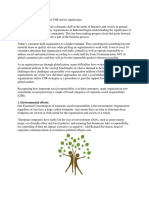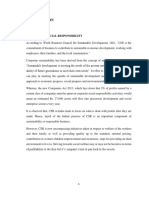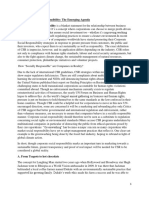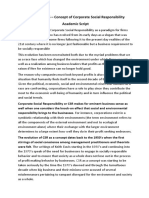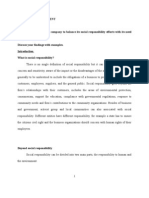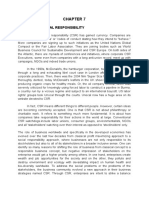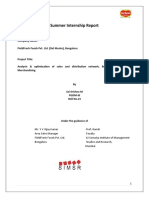What Is Corporate Social Responsibility?: by June 27, 2016 12:12 PM EST
What Is Corporate Social Responsibility?: by June 27, 2016 12:12 PM EST
Uploaded by
majid aliCopyright:
Available Formats
What Is Corporate Social Responsibility?: by June 27, 2016 12:12 PM EST
What Is Corporate Social Responsibility?: by June 27, 2016 12:12 PM EST
Uploaded by
majid aliOriginal Description:
Original Title
Copyright
Available Formats
Share this document
Did you find this document useful?
Is this content inappropriate?
Copyright:
Available Formats
What Is Corporate Social Responsibility?: by June 27, 2016 12:12 PM EST
What Is Corporate Social Responsibility?: by June 27, 2016 12:12 PM EST
Uploaded by
majid aliCopyright:
Available Formats
What is Corporate Social
Responsibility?
By Sammi Caramela, Business News Daily ContributorJune 27, 2016 12:12 pm
EST
3154
336
304
277
87
MORE
Credit: Kokliang/Shutterstock
Corporate social responsibility (CSR) refers to business practices involving
initiatives that benefit society. A business's CSR can encompass a wide
variety of tactics, from giving away a portion of a company's proceeds to
charity, to implementing "greener" business operations.
1. Environmental efforts: One primary focus of corporate social
responsibility is the environment. Businesses regardless of size have a
large carbon footprint. Any steps they can take to reduce those footprints
are considered both good for the company and society as a whole.
2. Philanthropy: Businesses also practice social responsibility by
donating to national and local charities. Businesses have a lot of
resources that can benefit charities and local community programs.
3. Ethical labor practices: By treating employees fairly and ethically,
companies can also demonstrate their corporate social responsibility. This
is especially true of businesses that operate in international locations with
labor laws that differ from those in the United States.
4. Volunteering: Attending volunteer events says a lot about a
company's sincerity. By doing good deeds without expecting anything in
return, companies are able to express their concern for specific issues
and support for certain organizations.
Why CSR matters
Liz Maw, CEO of nonprofit organization Net Impact, noted that CSR is
becoming more mainstream as forward-thinking companies embed
sustainability into the core of their business operations to create shared
value for business and society.
"Sustainability isn't just important for people and the planet, but also is vital
for business success," said Maw, whose company connects students and
professionals who want to use business skills to do social good.
"Communities are grappling with problems that are global in scope and
structurally multifaceted — Ebola, persistent poverty, climate change. The
business case for engaging in corporate social responsibility is clear and
unmistakable."
"More practically, [CSR] often represents the policies, practices and
initiatives a company commits to in order to govern themselves with honesty
and transparency and have a positive impact on social and environmental
wellbeing," added Susan Hunt Stevens, founder and CEO of employee
engagement platform WeSpire.
As consumers' awareness about global social issues continues to grow, so
does the importance these customers place on CSR when choosing where to
shop. But consumers aren't the only ones who are drawn to businesses that
give back. Susan Cooney, founder of crowdfunding philanthropy
platform Givelocity, said that a company's CSR strategy is a big factor in
where today's top talent chooses to work.
"The next generation of employees is seeking out employers that are
focused on the triple bottom line: people, planet and revenue," Cooney told
Business News Daily. "Coming out of the recession, corporate revenue has
been getting stronger. Companies are encouraged to put that increased
profit into programs that give back."[See Related Story: Social
Responsibility Tips for Your Business]
Examples of corporate social responsibility
While many companies now practice some form of social responsibility, some
are making it a core of their operations. Ben and Jerry's, for instance, uses
only fair trade ingredients and has developed a sustainability program for
dairy farms in its home state of Vermont. Starbucks has created its C.A.F.E.
Practices guidelines, which are designed to ensure the company sources
sustainably grown and processed coffee by evaluating the economic, social
and environmental aspects of coffee production. Tom's Shoes, another
notable example of a company with CSR at its core, donates one pair of
shoes to a child in need for every pair a customer purchases.
However, Stevens said companies need to really understand what their core
social purpose is and how that aligns with their stated mission, to create a
cohesive CSR strategy.
For example, Stevens said that Kashi, a Kellogg's brand, wants to increase
organic farming and is one of the few certified organic cereals. Since only 1
percent of U.S. farmland is actually organic, the breakfast brand worked with
Quality Insurance International to help certify new organic farmers across the
nation.
Practicing what you preach
Undertaking socially responsible initiatives is truly a win-win situation. Not
only will your company appeal to socially conscious consumers and
employees, but you'll also make a real difference in the world. Keep in mind
that in CSR, transparency and honesty about what you're doing are
paramount to earning the public's trust, Givelocity's Cooney said.
"If decisions [about social responsibility] are made behind closed doors,
people will wonder if there are strings attached, and if the donations are
really going where they say," Cooney said. "Engage your employees [and
consumers] in giving back. Let them feel like they have a voice."
Stevens, of WeSpire, reminded business owners that the corporate world has
more power than many realize, and using that power to improve the world
can bring people of all backgrounds, ages and interests together.
"Given their power and sheer size, corporations can solve big social problems
and have a huge impact," she said.
Additional reporting by Chad Brooks and Nicole Fallon
Taylor. Some source interviews were conducted for a
previous version of this article.
Definition of corporate social responsibility (CSR)
Movement aimed at encouraging companies to be more aware of the impact of their business on the
rest of society, including their own stakeholders and the environment. [1]
Corporate social responsibility (CSR) is a business approach that contributes to sustainable
development by delivering economic, social and environmental benefits for all stakeholders.
CSR is a concept with many definitions and practices. The way it is understood and implemented
differs greatly for each company and country. Moreover, CSR is a very broad concept that
addresses many and various topics such as human rights, corporate governance, health and safety,
dec venvironmental effects, working conditions and contribution to economic development.
Whatever the definition is, the purpose of CSR is to drive change towards sustainability.
Although some companies may achieve remarkable efforts with unique CSR initiatives, it is difficult
to be on the forefront on all aspects of CSR. Considering this, the example below provides good
practices on one aspect of CSR – environmental sustainability.
Example
Unilever is a multinational corporation, in the food and beverage sector, with a comprehensive CSR
strategy. The company has been ranked ‘Food Industry leader’ in the Dow Jones Sustainability
World Indexes for the 11 consecutive years and ranked 7th in the ‘Global 100 Most Sustainable
Corporations in the World’.
One of the major and unique initiatives is the ‘sustainable tea’ programme. On a partnership-based
model with the Rainforest Alliance (an NGO), Unilever aims to source all of its Lipton and PG Tips
tea bags from Rainforest Alliance Certified™ farms by 2015. The Rainforest Alliance Certification
offers farms a way to differentiate their products as being socially, economically and environmentally
sustainable. [2]
Print
Add Term to Watchlist
Share
FT Articles & Analysis
You might also like
- Extract DXM From Cough Syrups and GelcapsDocument9 pagesExtract DXM From Cough Syrups and Gelcapsno nameNo ratings yet
- Deere & Co. Worldwide Logistics: 1.0 Case StudyDocument20 pagesDeere & Co. Worldwide Logistics: 1.0 Case Studymajid aliNo ratings yet
- Case Study 3Document4 pagesCase Study 3majid aliNo ratings yet
- Products Category Pack Size MRP (RS.) : Qnet India Product Price List Effective April 1St 2020Document2 pagesProducts Category Pack Size MRP (RS.) : Qnet India Product Price List Effective April 1St 2020manik mahajan67% (3)
- Corporate Social ResponsibilityDocument8 pagesCorporate Social ResponsibilityShruti ChandraNo ratings yet
- Environmental EffortsDocument5 pagesEnvironmental EffortsSAURABH KUMARNo ratings yet
- Social Management ProjectDocument33 pagesSocial Management ProjectTejasNo ratings yet
- Corporate Social ResponsibilityDocument13 pagesCorporate Social ResponsibilityEmir KetchieNo ratings yet
- Corporate Social ResponsibilityDocument41 pagesCorporate Social ResponsibilityDiana Vergara MacalindongNo ratings yet
- It Elect 5 ReviewerDocument6 pagesIt Elect 5 ReviewerDionne Sebastian DoromalNo ratings yet
- What Is Corporate Social Responsibility or CSRDocument3 pagesWhat Is Corporate Social Responsibility or CSRAbrar HussainNo ratings yet
- Marketing ManagementDocument16 pagesMarketing ManagementShilu MNo ratings yet
- Your CPA Firm Encourages You To Contribute To CSR Causes Using Your Personal Time. Is Your Employer Being Ethical or Unethical? Why?Document3 pagesYour CPA Firm Encourages You To Contribute To CSR Causes Using Your Personal Time. Is Your Employer Being Ethical or Unethical? Why?Rodrigo MadrazoNo ratings yet
- Corporate Social Responsibility: The Emerging Agenda Corporate Social Responsibility Is A Blanket Statement For The Relationship Between BusinessDocument40 pagesCorporate Social Responsibility: The Emerging Agenda Corporate Social Responsibility Is A Blanket Statement For The Relationship Between BusinessRommela VelacruzNo ratings yet
- Ihrm Corporate Social ResponsibilityDocument4 pagesIhrm Corporate Social Responsibilityamrit0% (1)
- Corporate Social Responsibility A New Way of Doing Business..FINALDocument21 pagesCorporate Social Responsibility A New Way of Doing Business..FINALRavi Gupta100% (1)
- Corporate Social ResponsibilityDocument18 pagesCorporate Social ResponsibilityMaddy LeeNo ratings yet
- Corporate Social ResponsibilityDocument4 pagesCorporate Social ResponsibilityAishaNo ratings yet
- APW prac changesDocument52 pagesAPW prac changesAnshpreet KaurNo ratings yet
- Corporate Social ResponsibilityDocument8 pagesCorporate Social ResponsibilityJustin Miguel IniegoNo ratings yet
- CSR Sources and DraftsDocument17 pagesCSR Sources and DraftsKimberly Rose SumandeNo ratings yet
- Corporate Social ResponsibilityDocument3 pagesCorporate Social ResponsibilityDanish SarwarNo ratings yet
- 2 Obligations and Responsibilities PDFDocument5 pages2 Obligations and Responsibilities PDFaashir chNo ratings yet
- CSR NotesDocument15 pagesCSR NotesMelissa AndersonNo ratings yet
- Log in Sign Up: A Project Report On Corporate Social Responsibility On Amul Submitted TODocument11 pagesLog in Sign Up: A Project Report On Corporate Social Responsibility On Amul Submitted TOkomalNo ratings yet
- Corporate Social Responsibility (CSR) : Utkarsh Aryan 20BBA005 BBA (6 Sem)Document15 pagesCorporate Social Responsibility (CSR) : Utkarsh Aryan 20BBA005 BBA (6 Sem)Utkarsh AryanNo ratings yet
- PD ETE report SEM5Document16 pagesPD ETE report SEM5guddubhaiya1980No ratings yet
- Corporate Social Responsibility (CSR) : Utkarsh Aryan 20BBA005Document15 pagesCorporate Social Responsibility (CSR) : Utkarsh Aryan 20BBA005Utkarsh AryanNo ratings yet
- Lecture No. 16 - Concept of Corporate Social Responsibility Academic ScriptDocument8 pagesLecture No. 16 - Concept of Corporate Social Responsibility Academic ScriptShihab ChiyaNo ratings yet
- CSR Can Be Described As An Approach by Which A Company Does The FollowingDocument36 pagesCSR Can Be Described As An Approach by Which A Company Does The FollowingRAHUL GUPTANo ratings yet
- Besr 42822Document21 pagesBesr 42822Kathlene JaoNo ratings yet
- A Study On Corporate Social Responsibility in India Mr. N. SURYA SAI KUMAR., Asst - ProfessorDocument10 pagesA Study On Corporate Social Responsibility in India Mr. N. SURYA SAI KUMAR., Asst - ProfessorSurya SharmaNo ratings yet
- CSR of GodrejDocument21 pagesCSR of Godrejsana shaikh100% (1)
- Midterm BUS ETHICSDocument18 pagesMidterm BUS ETHICSJomari kim RellinNo ratings yet
- Week 2 NotesDocument9 pagesWeek 2 NotesRomesa MalikNo ratings yet
- Ram Kumar Mishra, Geeta Potaraju, and Shulagna Sarkar - Corporate Social Responsibility in Public Policy - A Case of IndiaDocument12 pagesRam Kumar Mishra, Geeta Potaraju, and Shulagna Sarkar - Corporate Social Responsibility in Public Policy - A Case of IndiaShamy Aminath100% (1)
- Corporate Social ResponsibilityDocument9 pagesCorporate Social ResponsibilityAnonymous rcntB2nNZNo ratings yet
- Assignment Report (2) : Title-Corporate Social ResponsibilityDocument17 pagesAssignment Report (2) : Title-Corporate Social ResponsibilitykanikaNo ratings yet
- UNIT 1 - CSR UpdatedDocument13 pagesUNIT 1 - CSR UpdatedChirurock TrividhiNo ratings yet
- quantum 1Document23 pagesquantum 1malik cpNo ratings yet
- Unit - 5 BECG - Corporate Social ResponsibilitiesDocument7 pagesUnit - 5 BECG - Corporate Social ResponsibilitiesrahulNo ratings yet
- What Is CSRDocument6 pagesWhat Is CSRabhishek jainNo ratings yet
- Corporate Social ResponsibilitiesDocument4 pagesCorporate Social ResponsibilitiesChandar BelaniNo ratings yet
- Business Ethics & Social ResponsibilityDocument9 pagesBusiness Ethics & Social Responsibilitynovey100% (6)
- Corporate Giving CSR As A Corporate Philanthropy and Its Application in The Strategic ContextDocument6 pagesCorporate Giving CSR As A Corporate Philanthropy and Its Application in The Strategic ContextJhazzNo ratings yet
- Environmental StudiesDocument4 pagesEnvironmental StudiesVaibhavNo ratings yet
- Learning Journal Unit 2Document5 pagesLearning Journal Unit 2menzlawynadaNo ratings yet
- Corporate Social Responsibility: CSR Can Be Described As An Approach by Which A Company Does The FollowingDocument40 pagesCorporate Social Responsibility: CSR Can Be Described As An Approach by Which A Company Does The FollowingRahul GuptaNo ratings yet
- The Benefits of Corporate Social ResponsibilityDocument2 pagesThe Benefits of Corporate Social ResponsibilityDavid Stivens CastroNo ratings yet
- Introduction CSRDocument12 pagesIntroduction CSRmarkomaleeNo ratings yet
- Corporate-Social-ResponsibilityDocument7 pagesCorporate-Social-ResponsibilityRashed karimNo ratings yet
- Corporate Social ResponsibilityDocument4 pagesCorporate Social ResponsibilityJean PaladaNo ratings yet
- CSR UNDER COVID byDocument15 pagesCSR UNDER COVID byinvestorspointssNo ratings yet
- Corporate Social ResponsibilityDocument9 pagesCorporate Social ResponsibilityPrabhjot SinghNo ratings yet
- MM Elect3 FinalsDocument13 pagesMM Elect3 FinalsKiki JeonNo ratings yet
- Corporate Social ResponsibilityDocument13 pagesCorporate Social ResponsibilityHina KhanNo ratings yet
- What Is Corporate Social Responsibility (CSR) ?: Vladimir Parallag XII ST, AgnesDocument5 pagesWhat Is Corporate Social Responsibility (CSR) ?: Vladimir Parallag XII ST, AgnesKuro No AkumaNo ratings yet
- GOVERNANCE Chapter 7 8 9 COMPILEDDocument191 pagesGOVERNANCE Chapter 7 8 9 COMPILEDeiaNo ratings yet
- Good GovernanceDocument4 pagesGood GovernancePhrexilyn PajarilloNo ratings yet
- Corporate Social ResponsibilityDocument24 pagesCorporate Social ResponsibilityJose Lester Correa DuriaNo ratings yet
- CSR in An MNC in BD, UnileverDocument23 pagesCSR in An MNC in BD, UnileverAbdullah Al Mahmud50% (2)
- Document CSR ActivityDocument9 pagesDocument CSR ActivityVinayak PadaveNo ratings yet
- SKF Authorize DD ST 01012022 01 3Document1 pageSKF Authorize DD ST 01012022 01 3majid aliNo ratings yet
- Well Tech White ConsumptionDocument1 pageWell Tech White Consumptionmajid aliNo ratings yet
- Tell Me About Your Self: Inbound Call CenterDocument3 pagesTell Me About Your Self: Inbound Call Centermajid aliNo ratings yet
- FAG Distributorship Certificate 2018-20Document1 pageFAG Distributorship Certificate 2018-20majid aliNo ratings yet
- Majid Ali: AchievementsDocument4 pagesMajid Ali: Achievementsmajid aliNo ratings yet
- Majid Ali: AchievementsDocument4 pagesMajid Ali: Achievementsmajid aliNo ratings yet
- AdressDocument1 pageAdressmajid aliNo ratings yet
- Majid Ali Resume (1 - )Document4 pagesMajid Ali Resume (1 - )majid aliNo ratings yet
- Majid Ali: Assistant of PPCDocument2 pagesMajid Ali: Assistant of PPCmajid aliNo ratings yet
- Majid Ali ResumeDocument4 pagesMajid Ali Resumemajid aliNo ratings yet
- The Islamia University of Bahawalpur: Marks Sheet Final Term BBA (1) R2 Session - 2014-2018Document2 pagesThe Islamia University of Bahawalpur: Marks Sheet Final Term BBA (1) R2 Session - 2014-2018majid aliNo ratings yet
- 20% Say No: Homework Is The Reason I FailDocument14 pages20% Say No: Homework Is The Reason I Failmajid aliNo ratings yet
- Homework Is A Necessity.: Report Post LikereplyDocument4 pagesHomework Is A Necessity.: Report Post Likereplymajid aliNo ratings yet
- The Islamia University of Bahawalpur Ranger Campus: Result SheetDocument1 pageThe Islamia University of Bahawalpur Ranger Campus: Result Sheetmajid aliNo ratings yet
- Assignment 1 DDGDocument1 pageAssignment 1 DDGmajid aliNo ratings yet
- Distribution Design & Globalization Assignment # 3: ID Full NameDocument2 pagesDistribution Design & Globalization Assignment # 3: ID Full Namemajid aliNo ratings yet
- Distribution Design and Golobalization: Assignment: 8Document3 pagesDistribution Design and Golobalization: Assignment: 8majid aliNo ratings yet
- What Is Leverage in Financial Management?Document12 pagesWhat Is Leverage in Financial Management?majid aliNo ratings yet
- Distribution Design & Globalization Assigment No # 6: ID NameDocument3 pagesDistribution Design & Globalization Assigment No # 6: ID Namemajid aliNo ratings yet
- Assignment 5 ToqeerDocument3 pagesAssignment 5 Toqeermajid aliNo ratings yet
- Distribution Design & Globalization Assigment No # 4 Import and Export AgreementsDocument3 pagesDistribution Design & Globalization Assigment No # 4 Import and Export Agreementsmajid aliNo ratings yet
- Classification of Musharakahf 1 Shirkat-Ul-Milk (Partnership by Joint OwnershipDocument4 pagesClassification of Musharakahf 1 Shirkat-Ul-Milk (Partnership by Joint Ownershipmajid aliNo ratings yet
- Rohi Motorcycle (RI 70 and 100) Is The Product of Rehman Auto Industry. 1Document53 pagesRohi Motorcycle (RI 70 and 100) Is The Product of Rehman Auto Industry. 1majid aliNo ratings yet
- Logistic Management Case-2 JC Penny Logistics Assignment 3 ID Full NameDocument3 pagesLogistic Management Case-2 JC Penny Logistics Assignment 3 ID Full Namemajid aliNo ratings yet
- 3-Ent2 - 033200016 - Assignment 2Document79 pages3-Ent2 - 033200016 - Assignment 2shi monNo ratings yet
- Maths ChallangeDocument10 pagesMaths Challangemkananu46No ratings yet
- Quiz 1 - InferenceDocument16 pagesQuiz 1 - Inferencevasuca2007No ratings yet
- The Rebound An Absolutely Hila - Catherine WalshDocument343 pagesThe Rebound An Absolutely Hila - Catherine WalshAlina Iordache100% (4)
- From Soup To Nuts: Unit 8 Freshman 2Document24 pagesFrom Soup To Nuts: Unit 8 Freshman 2LinaNo ratings yet
- CCC-GHC-BK1-06 - Legacy and Virtue v1.0Document21 pagesCCC-GHC-BK1-06 - Legacy and Virtue v1.0spicy.science029No ratings yet
- Elan Profile-2021Document34 pagesElan Profile-2021Ahmed RamzyNo ratings yet
- MNT Empty FormDocument2 pagesMNT Empty FormKathlene GamitNo ratings yet
- Lucas Bols Annual Report 22-23 - InteractiveDocument98 pagesLucas Bols Annual Report 22-23 - Interactivegames4sweeneyNo ratings yet
- All_This_TimeDocument20 pagesAll_This_TimevaishnavyjenuNo ratings yet
- 2021 Agri P2Document17 pages2021 Agri P2Carl ThomasNo ratings yet
- Fssai Guidance Document Spices 23-10-2018Document86 pagesFssai Guidance Document Spices 23-10-2018NavaneethanNo ratings yet
- Punjabi CultureDocument1 pagePunjabi Cultureas2152No ratings yet
- Summer Internship Report: Company Name: Fieldfresh Foods Pvt. Ltd. (Del Monte), BengaluruDocument37 pagesSummer Internship Report: Company Name: Fieldfresh Foods Pvt. Ltd. (Del Monte), Bengalurusaikrishnam100% (2)
- Sample PaperDocument6 pagesSample PaperGauri MittalNo ratings yet
- 609edad55f1c0316146f6340 - AP Human Geography Unit 5Document13 pages609edad55f1c0316146f6340 - AP Human Geography Unit 5hmahnoor746No ratings yet
- Microwave - Tasty and Delicious Dishes - (2020)Document113 pagesMicrowave - Tasty and Delicious Dishes - (2020)Gary TanNo ratings yet
- My Food Diary: Name: Kilitoy, Josselle LDocument2 pagesMy Food Diary: Name: Kilitoy, Josselle LJosselle KilitoyNo ratings yet
- Functionality and Protein Structure-American Chemical Society (1979)Document245 pagesFunctionality and Protein Structure-American Chemical Society (1979)Caitlyn CherylNo ratings yet
- Tybms Black Book ProjectDocument11 pagesTybms Black Book Projectanveshakapoor29% (7)
- Writing AssignmentDocument2 pagesWriting AssignmentFola AdedejiNo ratings yet
- Copy of Decodable Reader Vol 8 Gr 2-3 2014Document57 pagesCopy of Decodable Reader Vol 8 Gr 2-3 2014ashley.l3aileyNo ratings yet
- Restaurant Recommendations: Solutions 2nd Edition Upper-IntermediateDocument2 pagesRestaurant Recommendations: Solutions 2nd Edition Upper-IntermediateAgo FunesNo ratings yet
- STD 8 Agriculture .Docx FinalDocument40 pagesSTD 8 Agriculture .Docx FinalOlivia MusopoleNo ratings yet
- Prepared and Presented by 2 Semester /: Teacher: Uthman KargboDocument15 pagesPrepared and Presented by 2 Semester /: Teacher: Uthman KargboRayene MedabisNo ratings yet
- Raul Verbal HW - 2Document11 pagesRaul Verbal HW - 2sarkhanNo ratings yet
- Where Are The People in The Photo? What Do You Think They're Buying?Document125 pagesWhere Are The People in The Photo? What Do You Think They're Buying?LizbethNo ratings yet
- All Lab Report - Dairy ProductDocument42 pagesAll Lab Report - Dairy ProductV THNo ratings yet






